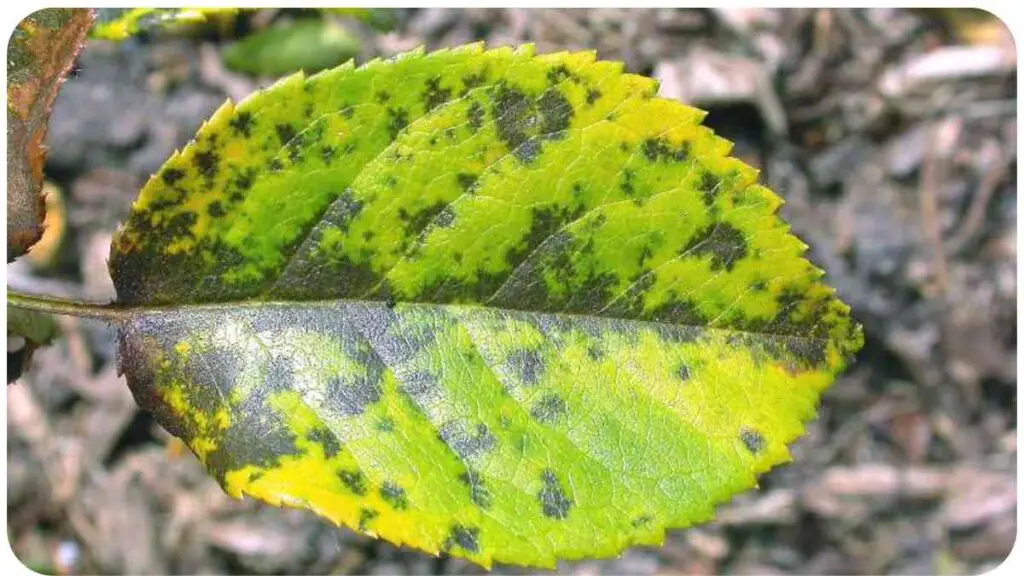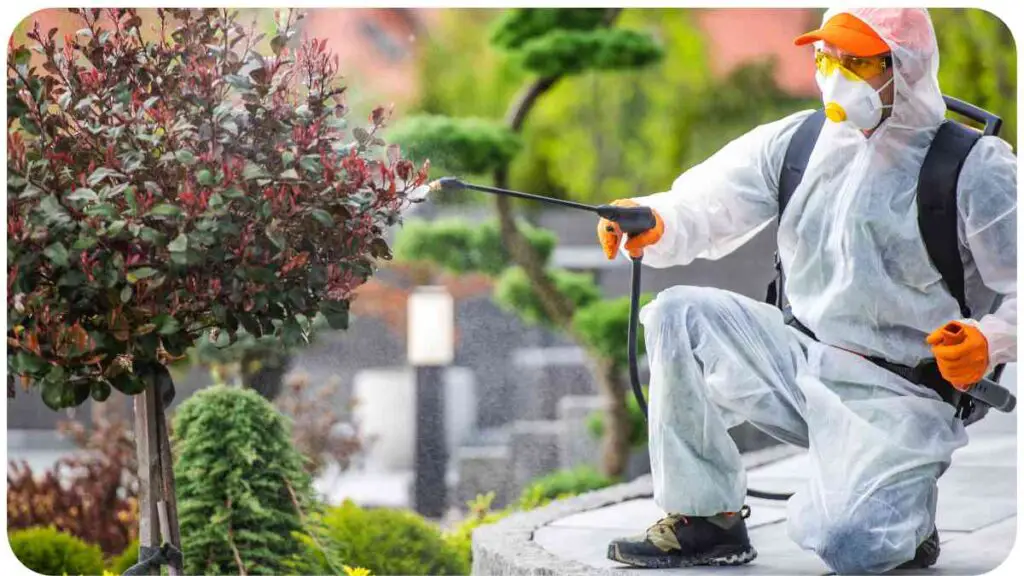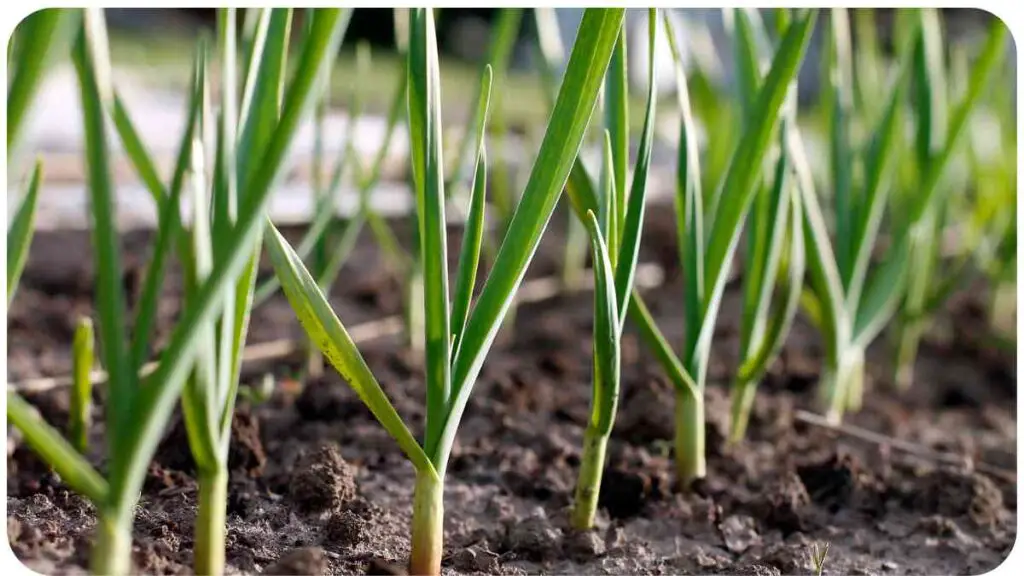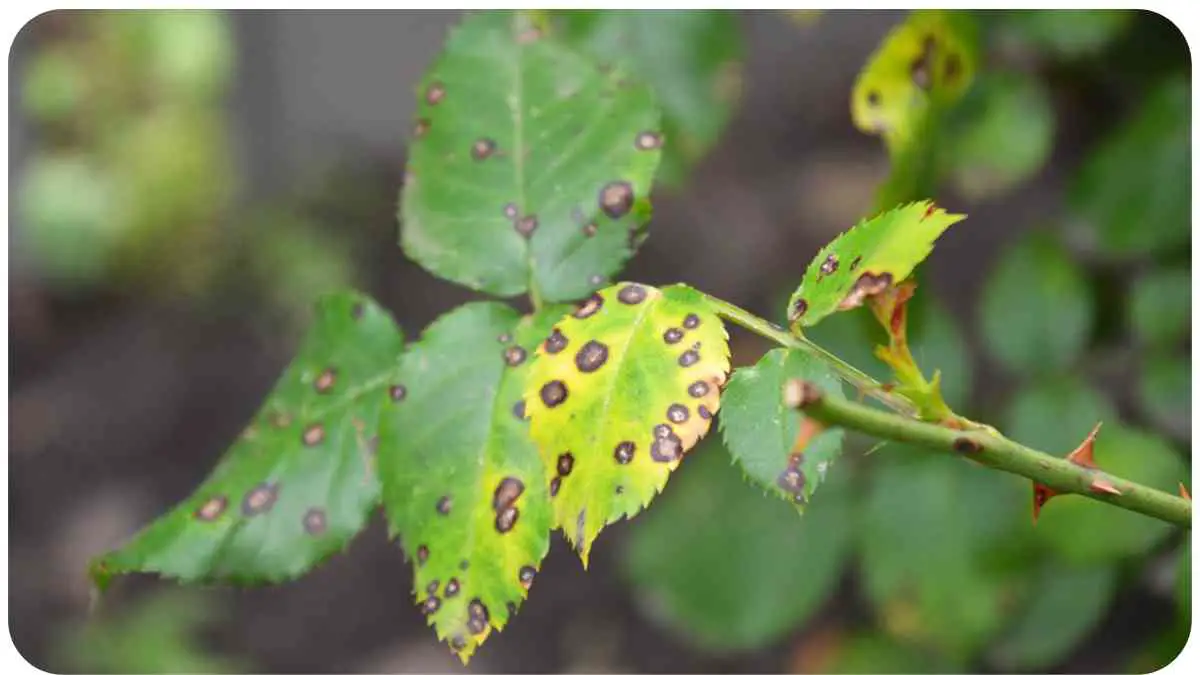Roses are often considered the queens of the garden, their delicate petals and enchanting fragrance capturing the hearts of many garden enthusiasts. However, even these regal beauties are not immune to problems, and one of the most common issues that plague rose growers is the appearance of those dreaded black spots on the leaves.
In this comprehensive guide, we will dive deep into the causes of black spots on roses and explore effective solutions to ensure your roses bloom in radiant health.
| Key Takeaways for Healthy Roses |
|---|
| 1. Regular maintenance, including pruning and trimming, is crucial for good air circulation and disease prevention. |
| 2. Proper watering techniques, like watering at the base in the morning, can help keep foliage dry and reduce the risk of black spots. |
| 3. Soil quality plays a vital role in rose health, so ensure your soil is well-draining and nutrient-rich. |
| 4. Balanced fertilization promotes robust growth, making your roses more resistant to black spot disease. |
| 5. Pest control measures should be implemented to prevent insects from weakening your roses. |
| 6. Organic solutions such as neem oil, baking soda spray, and garlic oil spray are effective in preventing and managing black spots. |
| 7. Chemical treatments like fungicides and systemic insecticides can also be used when needed. |
| 8. Companion planting with marigolds, lavender, garlic, and chives can help deter pests and reduce the risk of black spots. |
| 9. Regular inspections and choosing disease-resistant rose varieties are proactive steps in rose care. |
| 10. Patience and persistence are key to successfully overcoming black spots and cultivating healthy, beautiful roses. |
The Beauty of Roses
Before we get into the nitty-gritty of black spots, let’s take a moment to appreciate the sheer beauty of roses. Their vibrant colors and exquisite forms have made them symbols of love and passion for centuries. Whether you have a single potted rose or an entire rose garden, the sight of these blooms can be truly breathtaking.
When dealing with plant issues, like black spots on roses, it’s crucial to explore organic remedies. Discover more about rescuing your garden with organic remedies to ensure your blooms thrive.
But this allure can quickly fade when black spots rear their ugly heads.
The Problem of Black Spots

Black spots on rose leaves can be a disheartening sight. They not only detract from the visual appeal of your roses but also signal potential health problems for your plants. Understanding the causes of black spots is the first step in effectively dealing with this issue.
Identifying Black Spot Disease
Before we delve into the causes, let’s ensure we can recognize black spot disease. Look for small, round, dark spots with fringed edges on the leaves. As the disease progresses, these spots can grow larger and merge, eventually turning the entire leaf yellow and causing it to drop prematurely.
Common Causes of Black Spots
To effectively combat black spots, we need to understand their origins. There are several factors that contribute to the development of this fungal disease, and knowing them will empower you to take proactive measures.
Here’s a table summarizing the common causes of black spots:
| Cause | Description |
| Humid Conditions | Fungal diseases thrive in high humidity. |
| Poor Air Circulation | Stagnant air around the plants promotes fungus. |
| Infected Plant Debris | Leftover plant material can harbor fungi. |
| Water on Leaves | Wet foliage provides a breeding ground for spores. |
| Susceptible Rose Varieties | Some roses are more prone to black spots. |
Weather and Black Spots
The weather plays a significant role in the development of black spots. Rain and high humidity create the perfect environment for fungal growth. When you combine these factors with water on the leaves and poor air circulation, you have a recipe for black spot disaster.
Your roses are more likely to suffer during rainy seasons or in regions with consistently high humidity. Being aware of your local climate can help you prepare and take preventive measures.
Troubleshooting flower problems goes beyond just roses. Learn how to address issues like early daffodil wilting in this comprehensive troubleshooting guide and keep your garden in full bloom.
Rose Varieties and Susceptibility
Not all roses are created equal when it comes to black spot susceptibility. Some varieties have natural resistance, while others are more vulnerable. Knowing the tendencies of your roses can guide your care routines.
Here’s a table listing a few rose varieties and their susceptibility to black spots:
| Rose Variety | Susceptibility to Black Spots |
| Knock Out Roses | Low |
| Hybrid Tea Roses | Medium |
| Floribunda Roses | High |
| Antique Roses | Varies |
Preventive Measures
Now that we’ve identified the causes of black spots, let’s delve into the proactive steps you can take to ensure your roses stay vibrant and healthy. Prevention is often the most effective strategy against this pesky problem.
Pruning and Trimming
Regular pruning and trimming are essential for maintaining good air circulation in your rose bushes. By removing overcrowded and diseased branches, you reduce the risk of fungal spores finding a home on your roses.
Proper Watering
Watering your roses at the base and in the morning hours helps keep the foliage dry, making it less hospitable to fungal growth. Avoid overhead watering, which can splash water onto the leaves.
Soil Quality
Healthy soil means healthy roses. Ensure your soil is well-draining and rich in organic matter. Proper soil quality promotes strong root systems, which in turn help your roses withstand diseases.
Caring for roses requires proper attention and knowledge. If your succulents are drooping, here’s how to revive your desert gems with proper care, ensuring all your plants thrive.
Fertilization
Balanced fertilization encourages robust growth, making your roses less susceptible to black spots. However, avoid excessive nitrogen, which can lead to lush but vulnerable foliage.
Pest Control

Insects can weaken your roses, making them more susceptible to diseases. Implement a pest control regimen to keep these threats at bay.
Tables
Here’s a table summarizing the preventive measures:
| Preventive Measure | Description |
| Pruning and Trimming | Promotes air circulation and removes diseased branches. |
| Proper Watering | Water at the base and in the morning to keep leaves dry. |
| Soil Quality | Well-draining, nutrient-rich soil supports healthy roots. |
| Fertilization | Balanced fertilization for robust, disease-resistant growth. |
| Pest Control | Keep insects at bay to prevent plant weakening. |
Organic Solutions
For those who prefer a more natural approach to gardening, there are several organic solutions to combat black spots effectively. These methods not only protect your roses but also maintain the ecological balance of your garden.
Neem Oil
Neem oil is a fantastic organic remedy known for its antifungal properties. It not only helps prevent black spots but also serves as a general insect repellent. Mix neem oil with water and a bit of dish soap, then spray it on your roses.
Fertilizer issues can impact various plants, including roses and gardenias. Understand the signs and find solutions for fertilizer overload with this guide on gardenia care.
Baking Soda Spray
Baking soda is a common household item with surprising benefits for your roses. Mix a tablespoon of baking soda with a gallon of water and a few drops of dish soap. Spray this solution on your roses to prevent and control black spots.
Garlic Oil Spray
Garlic oil is a potent natural fungicide. Blend garlic cloves with water, strain the mixture, and add a few drops of dish soap. This concoction can help keep black spots at bay while repelling pests.
Tables
Here’s a table summarizing these organic solutions:
| Organic Solution | Ingredients | Application |
| Neem Oil | Neem oil, water, dish soap | Spray on roses as needed. |
| Baking Soda Spray | Baking soda, water, dish soap | Spray on roses every 1-2 weeks. |
| Garlic Oil Spray | Garlic cloves, water, dish soap | Spray on roses every 2-3 weeks. |
Chemical Treatments
While organic solutions are preferable for many gardeners, chemical treatments can also be effective in controlling black spots when used responsibly. Here are two commonly used chemical options:
Fungicides
Fungicides specifically formulated for roses can be a powerful tool in the fight against black spots. Follow the instructions on the product carefully and apply as needed, especially during periods of high humidity.
Maintaining the health of your roses is essential, just like caring for orchids. Explore tips and techniques for Phalaenopsis lovers to ensure both your orchids and roses thrive beautifully.”
Rose Systemic Insecticides
These insecticides not only protect against pests but also help control fungal diseases like black spots. They are absorbed by the plant, making them a long-lasting solution.
Tables
Here’s a table summarizing these chemical treatments:
| Chemical Treatment | Description | Application |
| Fungicides | Targeted fungal control for roses. | Apply as per product label. |
| Rose Systemic Insecticides | Dual protection against pests and fungal diseases. | Apply as per product label. |
Companion Planting
Companion planting involves strategically placing other plants near your roses to create a more harmonious garden environment. This can help deter pests and reduce the risk of black spots. Consider these companion plants:
Marigolds
Marigolds emit a scent that repels many pests, making them excellent companions for roses. Plant them around your rose bushes to discourage insects.
Lavender
Lavender not only adds beauty and fragrance to your garden but also acts as a natural pest repellent. Its aromatic oils can help protect your roses.
Garlic

Planting garlic near your roses can deter aphids and other pests. Plus, it adds a culinary bonus to your garden.
Chives
Chives are known to repel aphids and Japanese beetles, which can be a threat to roses. Their purple flowers also provide a lovely contrast.
Tables
Here’s a table summarizing these companion plants:
| Companion Plant | Benefits | Placement |
| Marigolds | Pest repellent | Plant around rose bushes. |
| Lavender | Pest repellent, aromatic fragrance | Plant near roses. |
| Garlic | Deters aphids and other pests | Plant near rose beds. |
| Chives | Repels aphids and Japanese beetles | Plant among rose bushes. |
Personal Experience: Overcoming Black Spots
As a seasoned gardener and rose enthusiast, I’ve had my fair share of battles with black spots on my roses. It can be frustrating to see those beautiful blooms marred by unsightly spots. However, I’ve learned a few valuable lessons along the way.
One of the most important things I’ve realized is the significance of regular maintenance. Pruning, trimming, and keeping my roses well-fed and hydrated have been crucial in preventing black spots. Additionally, I’ve experimented with both organic and chemical treatments, adjusting my approach based on the severity of the issue and my personal preferences.
It’s also worth noting that every rose variety is unique, and what works for one may not work for another. That’s why it’s essential to observe your roses closely and tailor your care routine to their specific needs.
Tables
Here’s a table summarizing the key takeaways from my personal experience:
| Key Takeaways | Description |
| Regular Maintenance | Pruning, trimming, and proper care are essential. |
| Experimentation | Don’t be afraid to try different treatments and adjust as needed. |
| Individualized Care | Each rose variety may require a unique approach. |
| Patience and Persistence | Overcoming black spots may take time and ongoing effort. |
Expert Tips for Rose Enthusiasts
To round out our comprehensive guide on black spots and roses, let’s tap into the expertise of seasoned rose enthusiasts and experts. These tips come from individuals who have dedicated years to cultivating healthy, beautiful roses:
- Regular Inspections: Conduct frequent inspections of your rose plants. Catching black spots early allows for more effective treatment.
- Disease-Resistant Varieties: When choosing rose varieties for your garden, opt for those known for their disease resistance. It’s an excellent preventive measure.
- Mulching: Apply a layer of mulch around the base of your roses. This helps maintain soil moisture levels and reduces the risk of water splashing onto the leaves.
- Morning Watering: Water your roses in the morning so that they have time to dry before evening. Wet foliage at night can invite fungal growth.
- Cleanliness: Keep your garden clean by removing fallen leaves and other plant debris promptly. This reduces the chance of fungal spores lingering.
Tables
Here’s a table summarizing these expert tips:
| Expert Tips | Description |
| Regular Inspections | Early detection is key. |
| Disease-Resistant Varieties | Choose roses known for resistance. |
| Mulching | Helps with moisture control. |
| Morning Watering | Leaves time for drying. |
| Cleanliness | Remove plant debris promptly. |
Conclusion
In the world of gardening, roses hold a special place, captivating our hearts with their elegance and fragrance. However, the appearance of black spots on their leaves can be disheartening. Fortunately, armed with knowledge and the right strategies, you can keep these beautiful blooms in radiant health.
We’ve explored the causes of black spots, from weather and humidity to susceptible rose varieties. We’ve discussed preventive measures, both organic and chemical, as well as the benefits of companion planting. Drawing from personal experience and expert insights, we’ve uncovered the keys to successful rose care.
Remember that tending to your roses is a journey, and each season brings new challenges and triumphs. With dedication and the information shared in this guide, you’ll be well-equipped to overcome the hurdles of black spots and continue enjoying the timeless beauty of your rose garden.
In the end, the sight of those vibrant, healthy blooms will make all your efforts worthwhile. Happy gardening!
Further Reading
Here are some additional resources to deepen your understanding of black spots on roses:
- Garden Design – Black Spot on Roses
- Explore comprehensive information on identifying and treating black spot disease on roses.
- GardenTech – Fighting Black Spot on Roses
- Discover practical tips and strategies for effectively combating black spots and maintaining healthy roses.
- The Spruce – Black Spot on Roses
- Learn about the causes, prevention, and treatment of black spot disease in roses from this authoritative source.
FAQs
What is black spot disease on roses?
Black spot disease is a fungal infection that affects rose plants, leading to the development of dark, round spots with fringed edges on the leaves.
What causes black spots on rose leaves?
Black spots are primarily caused by a combination of factors, including high humidity, poor air circulation, and the presence of fungal spores.
How can I prevent black spots on my roses?
Prevention strategies include regular pruning, proper watering techniques, soil improvement, and the selection of disease-resistant rose varieties.
Are there organic remedies for black spot control?
Yes, organic solutions like neem oil, baking soda spray, and garlic oil spray can help prevent and manage black spots on roses.
When should I apply fungicides for black spot control?
Fungicides should be applied as a preventive measure during periods of high humidity or at the first signs of black spot disease on your roses.

I am Hellen James, a landscape architect. For many years I have written about landscaping for various publications; however, recently decided to focus my writing on personal experience as a profession.

